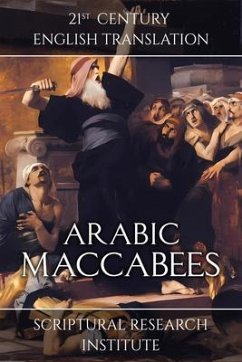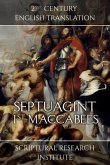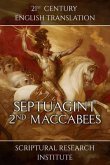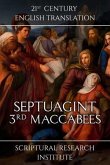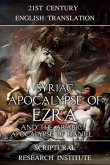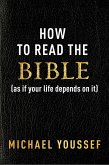Arabic Maccabees is the longest surviving book of Maccabees, however, does not appear to have originated as a book of Maccabees, but a pseudo-history book of the independent Kingdom of Judea from the Maccabean Revolt through the death of Herod the Great. The book concludes by claiming the story of Herod's son Antipater in the book the author had previously written, which does not appear to have survived to the present. This lost book was probably not translated into Arabic like Arabic Maccabees, as it would have covered the era when Jesus was born, but probably did not mention him. The Arabic translation appears to have been made by a Christian, while the original text appears to have been written in Palestinean Aramaic by a Jewish woman, sometime in the mid 6th century AD.
The text only survives in Arabic, which is the reason it is named Arabic Maccabees. It is also known somewhat erroneously as 5th Maccabees, based on the similar Syriac book of 5th Maccabees, however, the Syriac book is simply a translation of Josephus' The Judean War. The title of 5th Maccabees was introduced to the Arabic book by Anglican historian Henry Cotton in 1832, and picked up by other English authors, however, is not accurate. Josephus' The Judean War is considered extended canon in the Syriac Bibles under the name 5th Maccabees, as well as the Ethiopic Bibles under its original name, while Arabic Maccabees is not considered canon in any bible.
The author appears to have intended the book as a 'Jewish' history book, which is often not dependent on historical facts. The author clearly had access to ancient sources, like Josephus' Antiquities of the Judeans, however, deviates from the older sources so often that the deviations cannot be errors. The author uses poetic terminology, such as referring to Judea as the 'Holy Land,' and Jerusalem as the 'city of the sacred temple,' giving the work a mythic quality. It suggests she intended the work for adolescents, unlike the earlier writers' works, which were intended for adults.
Most of the content of the book is a retelling of the stories found in the Septuagint's 1¿¿ and 2n¿ Maccabees and Josephus' Antiquities of the Judeans, however, chapter 12 is only otherwise found in Hebrew Maccabees. Chapters 1 through 17 are remarkably similar to the content of Hebrew Maccabees, suggesting it was the primary source used by the author of Arabic Maccabees for the first third of the book. It is likely that the rest was reworked from some ancient source, and Jason of Cyrene, Justus of Tiberias, or Nicolaus of Damascus have all been proposed as sources as little of their work has survived to the present, although it was considered important during the Roman era.
Justus of Tiberias was a 1st-century Jewish historian who had been the secretary of King Herod Agrippa II, the last ruler from the Herodian dynasty who reigned over territories outside of Judea as a Roman client. Agrippa II fled Jerusalem in 66 AD, during the Judean uprising, and supported the Roman side in the First Judean-Roman War. Although Justus had not been mentioned in Josephus' earlier The Judean War, Josephus wrote over 30 pages in his autobiography attacking Justus. One of Josephus' claims was that Justus' History of the Judean War was filled with errors, but does not discuss them in detail. Josephus claimed that Justus' work lacked facts because Justus did not have access to the field notes of Vespasian and Titus, which suggests that Justus' work was written from the Judean perspective, and ignored the Roman perspective, unlike Josephus' work. Justus also wrote the Chronicle of the Judean Kings, which survived until the 9th century, but its content is unknown today. If it was also written from the Judean perspective, and not too dependent on facts, it is possible that the author of Arabic Maccabees used it as a source.
The text only survives in Arabic, which is the reason it is named Arabic Maccabees. It is also known somewhat erroneously as 5th Maccabees, based on the similar Syriac book of 5th Maccabees, however, the Syriac book is simply a translation of Josephus' The Judean War. The title of 5th Maccabees was introduced to the Arabic book by Anglican historian Henry Cotton in 1832, and picked up by other English authors, however, is not accurate. Josephus' The Judean War is considered extended canon in the Syriac Bibles under the name 5th Maccabees, as well as the Ethiopic Bibles under its original name, while Arabic Maccabees is not considered canon in any bible.
The author appears to have intended the book as a 'Jewish' history book, which is often not dependent on historical facts. The author clearly had access to ancient sources, like Josephus' Antiquities of the Judeans, however, deviates from the older sources so often that the deviations cannot be errors. The author uses poetic terminology, such as referring to Judea as the 'Holy Land,' and Jerusalem as the 'city of the sacred temple,' giving the work a mythic quality. It suggests she intended the work for adolescents, unlike the earlier writers' works, which were intended for adults.
Most of the content of the book is a retelling of the stories found in the Septuagint's 1¿¿ and 2n¿ Maccabees and Josephus' Antiquities of the Judeans, however, chapter 12 is only otherwise found in Hebrew Maccabees. Chapters 1 through 17 are remarkably similar to the content of Hebrew Maccabees, suggesting it was the primary source used by the author of Arabic Maccabees for the first third of the book. It is likely that the rest was reworked from some ancient source, and Jason of Cyrene, Justus of Tiberias, or Nicolaus of Damascus have all been proposed as sources as little of their work has survived to the present, although it was considered important during the Roman era.
Justus of Tiberias was a 1st-century Jewish historian who had been the secretary of King Herod Agrippa II, the last ruler from the Herodian dynasty who reigned over territories outside of Judea as a Roman client. Agrippa II fled Jerusalem in 66 AD, during the Judean uprising, and supported the Roman side in the First Judean-Roman War. Although Justus had not been mentioned in Josephus' earlier The Judean War, Josephus wrote over 30 pages in his autobiography attacking Justus. One of Josephus' claims was that Justus' History of the Judean War was filled with errors, but does not discuss them in detail. Josephus claimed that Justus' work lacked facts because Justus did not have access to the field notes of Vespasian and Titus, which suggests that Justus' work was written from the Judean perspective, and ignored the Roman perspective, unlike Josephus' work. Justus also wrote the Chronicle of the Judean Kings, which survived until the 9th century, but its content is unknown today. If it was also written from the Judean perspective, and not too dependent on facts, it is possible that the author of Arabic Maccabees used it as a source.
Dieser Download kann aus rechtlichen Gründen nur mit Rechnungsadresse in A, D ausgeliefert werden.

